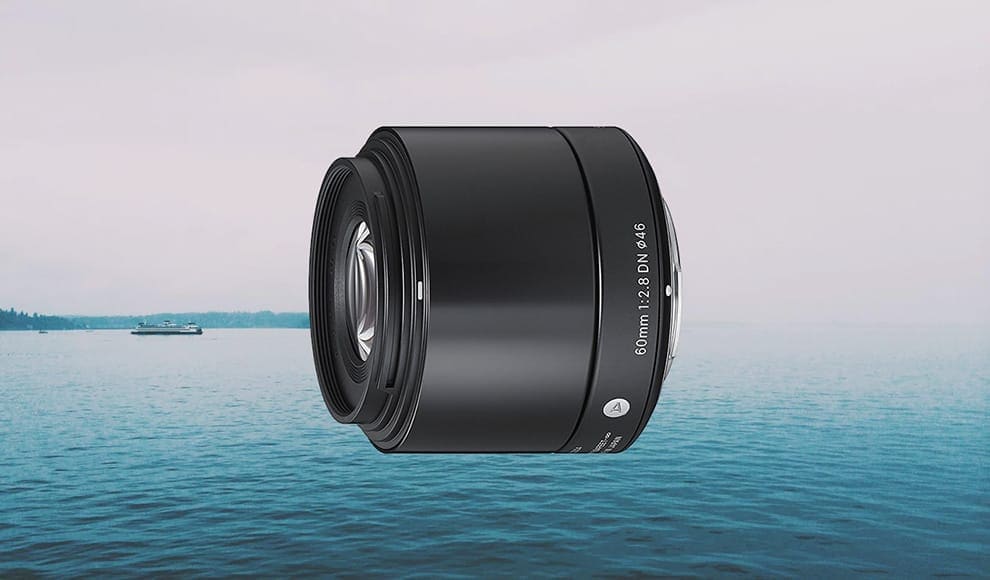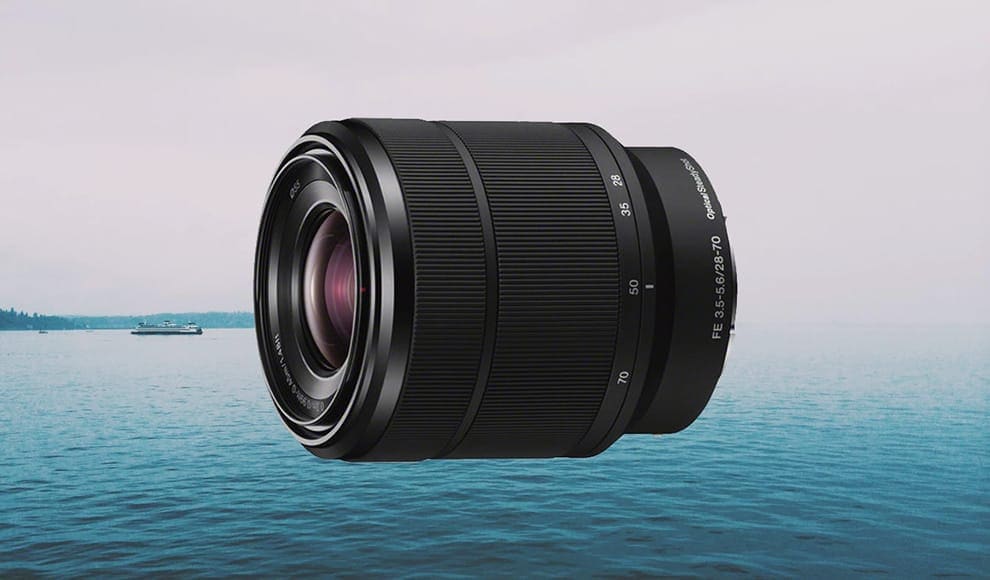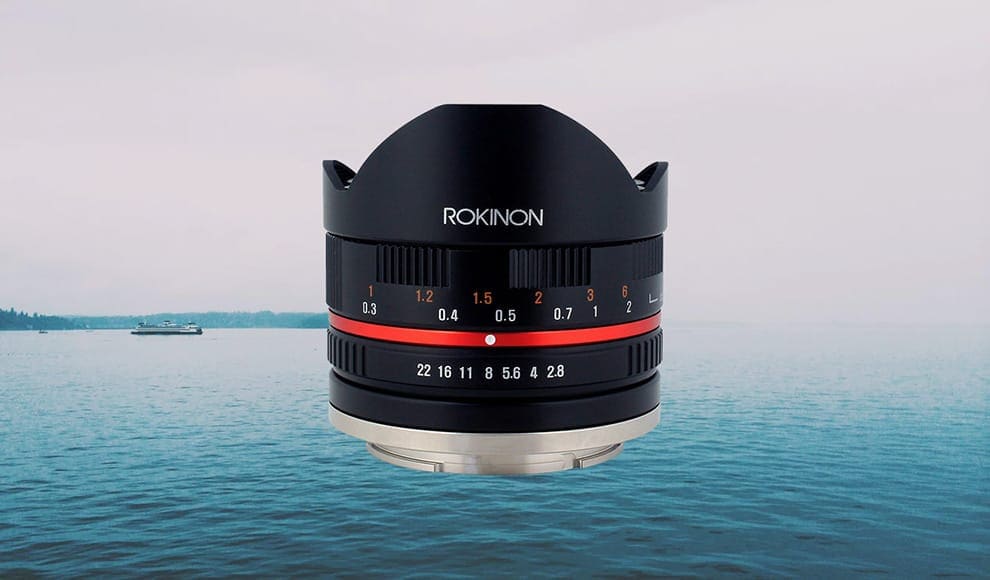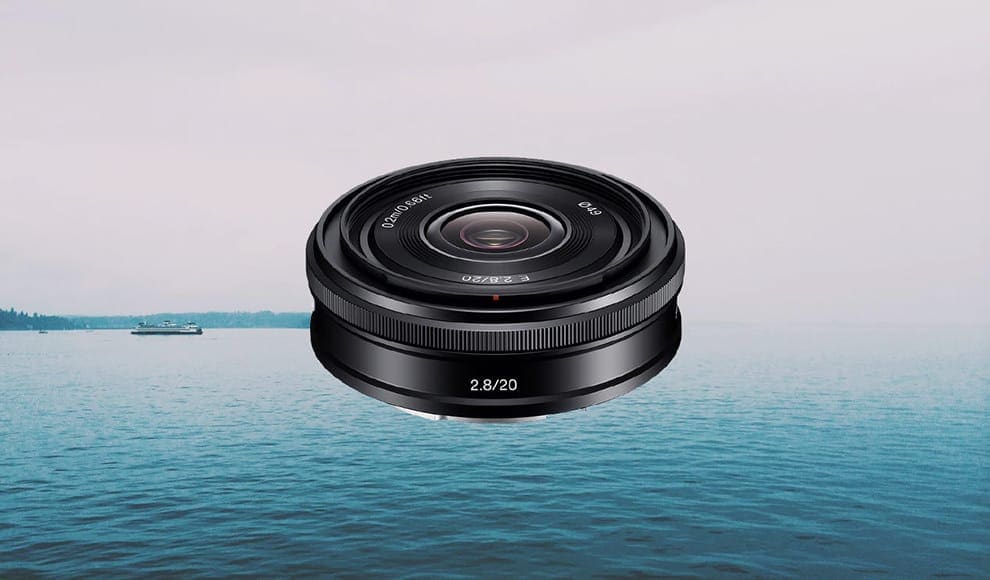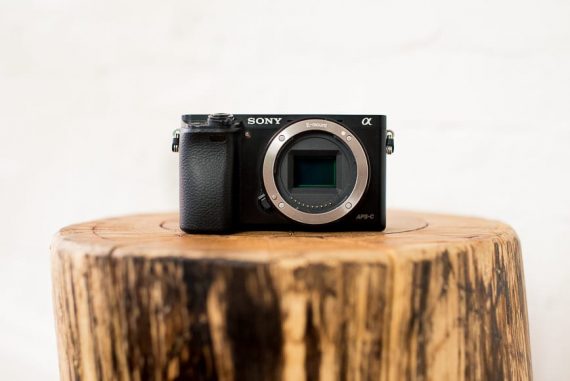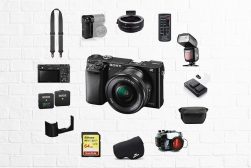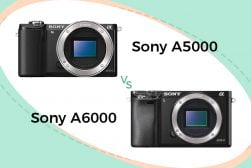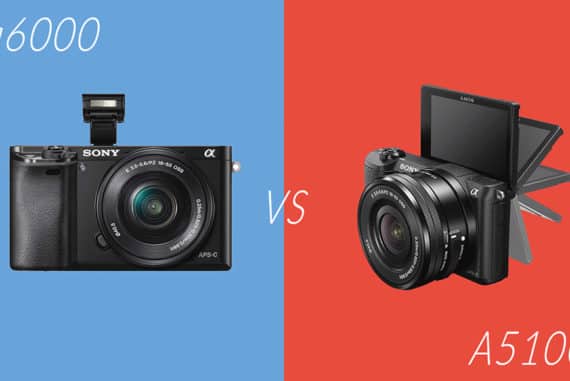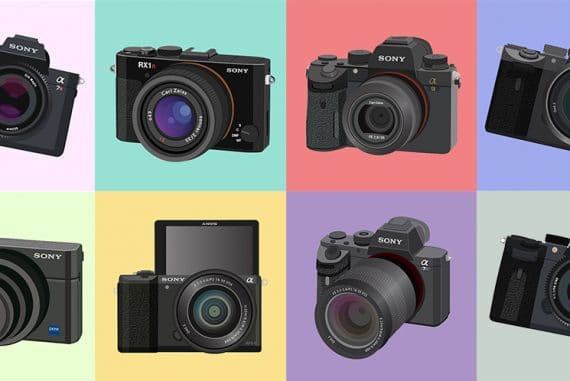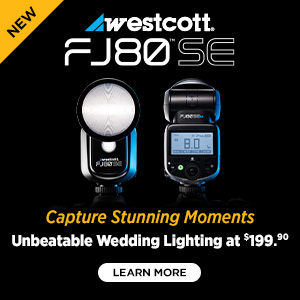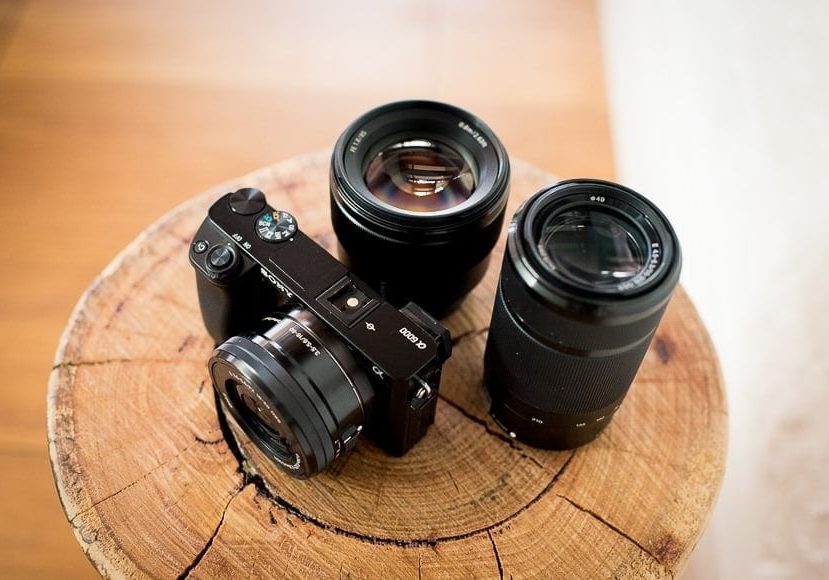
5 Sony a6000 Lenses You Need (APS-C Alpha e-Mount)
Investing in the best lens for Sony a6000 is a fun and affordable way to breathe new life out of the top-selling mirrorless camera of all time.
Camera Gear Guides | Lens Guides | Sony Lens Guides | By Mark Condon | Last Updated: February 23, 2024
The Sony a6000 is already ten years old, but it’s still the best-selling mirrorless camera of all time.
To get the most out of your a6000, you need to invest in the best Sony E-Mount lenses.
Affordable, lightweight, compact and fun. Blur the background of your photos to make your subject *pop*. This lens is the best bang for your buck.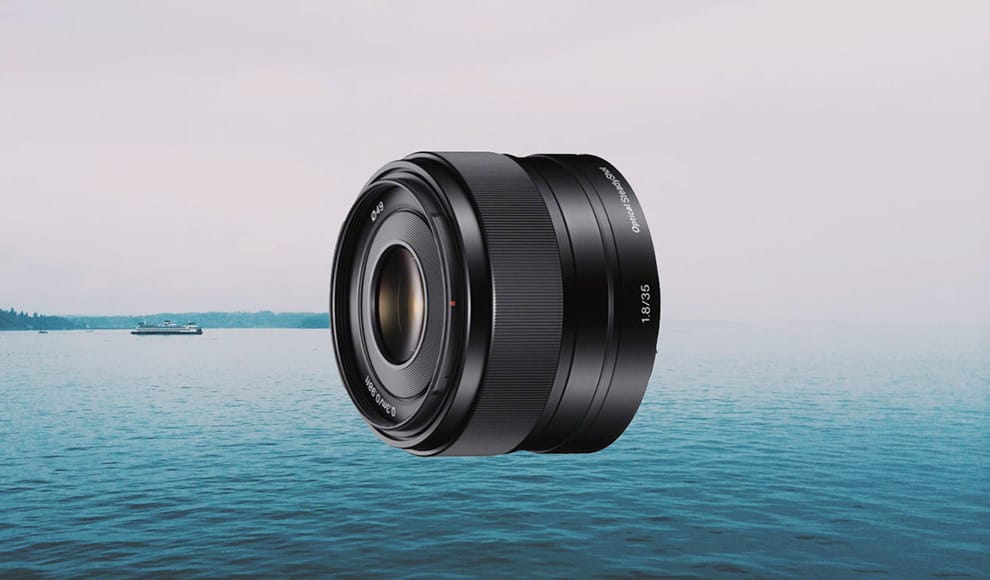
![]()
After shooting over 5,000 images with this powerful camera, I know exactly which lenses are best for Sony a6000 owners.
The a6000 works best with compact prime and zoom lenses to keep its overall dimensions small.
Fast maximum aperture lenses will help you take advantage of the a6000’s 10/11fps burst rate without having to resort to high ISOs.
If you want the best all-round Sony a6000 lens, tap the button above to get my top pick.
Otherwise, keep reading to see all the recommendations.
What are the Best Lenses for Sony a6000 in 2024?
| Image | Product | Features | |
|---|---|---|---|
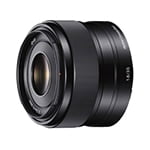 | Sony E 35mm f/1.8 OSSOUR #1 CHOICE |
| Check AMAZON Price → Check B&H Price → |
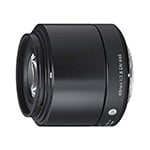 | Sigma 60mm f/2.8 DNBEST FOR PORTRAITS |
| View Price → |
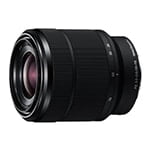 | Sony FE 28-70mm f/3.5-5.6 OSSBEST ZOOM |
| Check AMAZON Price → Check B&H Price → |
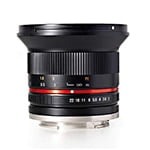 | Rokinon 12mm f/2 NCSBEST WIDE ANGLE |
| Check AMAZON Price → Check B&H Price → |
 | Sony E 20mm f/2.8BEST FOR TRAVEL |
| Check AMAZON Price → Check B&H Price → |
Below, you’ll find my reviews of the five best lenses for the Sony a6000.
All of them are Sony APS-C E-mount lenses, which can be used on any other Sony mirrorless camera, but I’ve concentrated specifically on those that perform best with the a6000.
To add some variety to my recommendations, I also reviewed a selection from the competitively-priced non-Sony-branded lenses, which work well with the Sony a6000 mount type.
Here are some of the Sony a6000 best lenses.
1. Sony E 35mm f/1.8 OSS | All Round Best Sony a6000 Prime Lens
Focal Length: 35mm (equivalent to 52.5mm)
Weight: 154g (5.5 oz.)
Size (Diameter x Length): 63 x 45mm (2-1/2 x 1-13/16in.)
Filter Diameter: 49mm
Minimum Focus Distance: 0.3m (0.99ft)
I’m a big fan of prime lenses and recommend them to all levels of photographers.
They’re the quickest way to get better at composition, simplifying the picture-taking process by removing the variable of multiple focal lengths (as offered by zooms).
Don’t get me wrong, zooms have their place in photography. However, I believe every photographer should have at least one small, fast prime lens… and for Sony a6000 owners, this Sony 35mm 1.8 OSS lens is it.
If you own a mirrorless camera as small as the Sony a6000, it seems silly to put an enormous lens on it.
Paired with this dinky 35mm lens, the camera will be a pleasure to shoot and still fit into a jacket pocket – something DSLR camera owners can only dream of (see my mirrorless vs DSLR buyer’s guide).
On the cropped sensor (APS-C) Sony a6000, this lens will give roughly a 50mm field of view, which is ideal for a whole range of subjects.
50mm is a popular focal length since it gives an undistorted view of the world and can be flattering for portraits without making the subject feel detached like a longer lens can.
By ‘fast’ prime lens, I mean that the lens aperture (as represented by the f-number) is wide enough to allow faster shutter speeds and lower ISOs in low light.
In other words, the f/1.8 of this Sony 35mm f/1.8 lens will allow you to take photos with the Sony a6000 in low light without a flash, much easier than with a ‘slower’ lens such as the Sony a6000 kit lens. (The smaller the f-number, the larger the aperture).
An aperture of f/1.8 also means that you’ll be able to get that coveted blurred background look that really separates lesser cameras.
Sure, your iPhone ‘portrait mode’ may be able to do something similar, but the process is much slower with the mobile phone and its fancy AI.
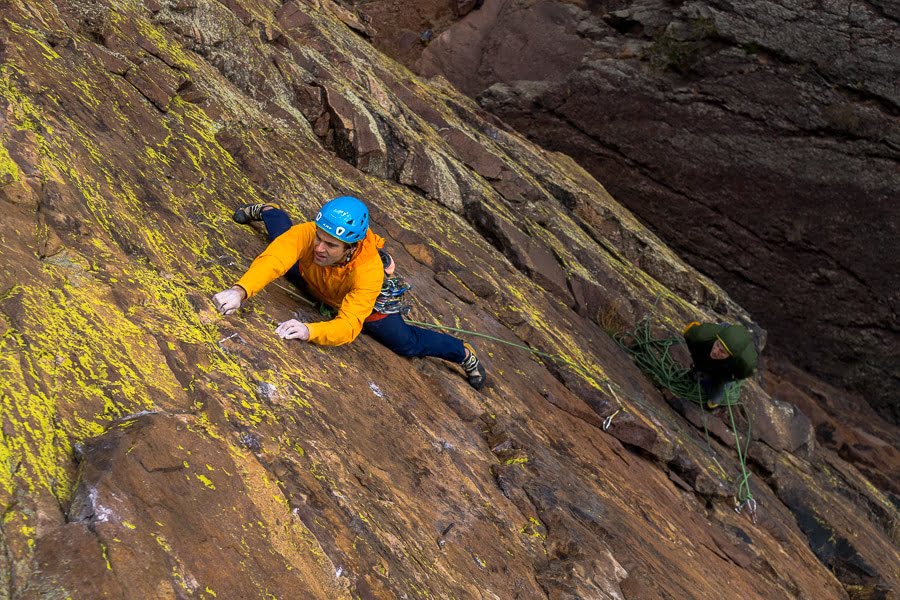
Sony 35mm f/1.8 | 1/640 f/4 ISO 200 | © Marc Bergreen
As for image quality, the Sony 35mm f/1.8 lens delivers images that simply aren’t possible with the kit lens that comes with your a6000.
Sharpness is impressive at f/1.8 and continues to improve to around f/4, where the sharpness and overall contrast excel for a lens of this price.
On the topic of price, at around $400, you may hesitate, especially as several Sony Alpha a6000 lenses can be found cheaper…
However, a camera is only as good as its lens, and by investing in the Sony 35mm f/1.8, you’re really making the most of your a6000’s abilities.
The ‘OSS’ refers to Optical SteadyShot (image stabilization), a feature that is rare on prime lenses.
In combination with the fast f/1.8 aperture, this makes the lens excellent for low-light shooting, allowing you to keep the ISO of your Sony a6000 as low as possible to create noise-free images.
Overall, the Sony 35mm f/1.8 lens is the best prime lens for Sony a6000 owners who want a small and lightweight setup with excellent optical performance – it’s the perfect travel camera/lens combination and the best Sony a6000 35mm lens.
2. Sigma 60mm f/2.8 DN | Best Portrait Lens for Sony a6000
Focal Length: 60mm (equivalent to 90mm)
Weight: 190g / 6.7oz.
Size (Diameter x Length): 60.8mm x 55.5mm / 2.4in x 2.2in
Filter Diameter: 46mm
Minimum Focus Distance: 50cm / 19.7in
Here’s a bit of a curveball from Sigma in this guide to the best lenses for the Sony a6000. Remember that you don’t always need to match brands when buying lenses for your camera.
If this Sigma lens for Sony a6000 users didn’t exist, I would have included the Sony 50mm f/1.8 OSS lens – it’s faster, includes image stabilization, and is great value for money now that it’s dropped in price to under $300.
However, this Sigma has changed all that – the Sigma 60mm f/2.8 DN is quite simply the best portrait lens for Sony a6000 owners.
With an APS-C equivalent focal length of 90mm, your subject will look in perfect proportion, with their features compressed like reality (as opposed to distorted by a wide-angle lens).
Medium telephoto focal lengths such as this one allow you to stand about 6 feet away from your subject and still fill your viewfinder’s frame with their head and shoulders for a flattering headshot.
Does that mean this Sigma is only suitable for portraits? Not at all – it just means that you’ll need to be able to stand back far enough to fit everything into your frame.
Telephoto lenses can be used for landscape photography to provide beautiful compression of the scenery, making background mountains appear closer to a foreground element, for example.
Despite being solidly built, the Sigma 60mm f/2.8 DN is actually rather light, making it another ideal prime lens companion for your Sony a6000.
Being lightweight also means focusing is silent and completely unobtrusive – something that video shooters will appreciate.
Images taken with the Sigma 60mm f/2.8 DN are incredibly sharp and contrasty, with vivid colours straight out of camera.
The f/2.8 aperture combined with the focal length delivers beautiful, creamy bokeh, which will help separate your subject from the background.
There’s no noticeable vignetting, distortion or chromatic aberration… basically, this means that your photos will look pretty darn good, with no fiddling necessary afterwards in Lightroom!
As for the price, well at a little under $250, this impressive little lens is by far the best value lens you can attach to your Sony a6000 – see more of the best Sigma lenses.
Note that this Sony a6000 portrait lens is also available with a different mount for micro-four-third cameras, so be sure you select the correct one for your a6000 when ordering (check the box marked ‘Sony NEX’). It’s also available in black or silver.
3. Sony FE 28-70mm f/3.5-5.6 OSS | Best Zoom Lens for Sony a6000
Focal Length: 28-70mm zoom (equivalent to 40-105mm)
Weight: 295g (10.5oz.)
Size (Diameter x Length): 72.5 x 83mm (2-7/8 x 3-3/8in.)
Filter Diameter: 55mm
Minimum Focus Distance: 0.3-0.45m (0.99-1.48ft)
With Sony a6000 compatible lenses, there are a lot of confusing abbreviations and naming conventions you’ll come across.
For the purposes of this best lenses for a6000 owners article, all you need to know are ‘FE’ and ‘E’.
The ‘FE’ as opposed to ‘E’ in this zoom lens’ name refers to the fact that this is actually a lens meant for professional full-frame Sony E-mount cameras.
It actually comes bundled as a kit lens with the Sony a7 camera. So, why am I recommending it here as one of the best lenses?
Normally I wouldn’t recommend buying an ‘FE’ lens for the APS-C sensor Sony a6000, since they’re much more expensive. However, with the suprisingly affordable Sony FE 28-70mm f/3.5-5.6 OSS, it’s an offer too good to miss.
At less than $300, this Sony zoom lens is an absolute bargain and perfectly suited to the Sony a6000.
It also means that if you ever decide to upgrade to a full-frame Sony camera, you’ll already have the best Sony a6000 zoom lens waiting in your camera bag!
The 40-105mm equivalent focal length makes the Sony FE 28-70mm f/3.5-5.6 OSS zoom particularly useful for subjects that change distance frequently, such as when photographing children or for sports photography.
Using a Sony FE lens on a cropped sensor camera basically means that the edges of the lens won’t be in use. On wide-angle lenses, this ‘missing width’ may be an issue, but on longer lenses such as this one, it doesn’t really matter.
As an additional bonus, in using the Sony FE 28-70mm f/3.5-5.6 OSS on a Sony a6000, you’re actually ‘cropping’ the edges of the frame, thus eliminating any edge softness that may have otherwise existed on a full-frame camera.
The image quality is impressive, as can be expected from a lens that’s meant for pro-grade full-frame cameras. It’s sharp, contrasty and produces great bokeh – more due to the focal lengths at which you’ll be shooting as opposed to the aperture.
On the topic of aperture, you won’t be shooting much after dark without a flash since this Sony a6000 telephoto lens is restricted to f/3.5-5.6.
However, I do appreciate the inclusion of Sony’s excellent Optical Steady Shot, which compensates for the minor hand movements that are particularly common when shooting at longer focal lengths and can cause blurred images.
Another nice feature of the Sony FE 28-70mm f/3.5-5.6 OSS is weather-sealing – a rare feature on Sony a6000 zoom lenses – but unfortunately, you won’t be able to take advantage of this since the camera body isn’t weather-sealed.
However, a weather-sealed lens also means that it’ll be built to last, no matter what camera body you attach it to.
If you’re looking for a great zoom lens for your Sony a6000 at a bargain price, look no further than this little beauty. This is one of if not the best budget lens for Sony A6000.
I’d also go as far as to call it the best multipurpose lens for Sony a6000 owners since it covers such a wide focal range and can do away with 2 or 3 other lenses.
4. Rokinon 12mm f/2 NCS | Best Wide Angle Lens for Sony a6000
Focal Length: 12mm (equivalent to 18mm)
Weight: 245g (8.64oz.)
Size (Diameter x Length): 72.5 x 59mm (2.85 x 2.33 in.)
Filter Diameter: 67mm
Minimum Focus Distance: 7.87”(0.2m)
After adding a small, fast prime and a telephoto zoom to your Sony E-Mount lens collection, the next one you’ll want in your camera bag is a Sony a6000 wide-angle lens… or, in this case, an ultra-wide angle lens!
The Rokinon 12mm f/2 NCS has been made especially for mirrorless cameras (be sure you get the correct one for the Sony a6000 here). This is a popular Sony a6000 wide angle lens.
For a wide-angle lens to remain wide angle on a cropped sensor body like the a6000’s, it must be truly WIDE.
With its equivalent 18mm field of view, you can create some really compelling, immersive images with this fun lens.
The obvious use of wide-angle lenses is for shots of vast landscapes, but another usage is to tell more of a story in one image by including a foreground element and multiple background elements.
At 18mm, you can place a subject in the centre of the frame (to minimise distortion), and still have enough ‘room’ around them to show their environment – it’s a skill, but a great way to really improve your photography.
One thing to note is that the Rokinon 12mm f/2 NCS is a manual focus lens (i.e. it doesn’t have autofocus).
Normally I wouldn’t recommend lenses that you need to twist yourself to focus, but with a wide-angle lens, not having autofocus is excusable since so much of the image will fall into focus without much fine-tuning – any objects from about 2 metres away to infinity will be in focus simultaneously.
With an aperture of f/2, you can use the Rokinon 12mm f/2 NCS in lower light too without needing to bump up the ISO of your Sony a6000.
Another advantage of wide-angle lenses is that small movements when photographing aren’t as noticeable in the final image, meaning you can also benefit from slower shutter speeds without needing to raise the ISO.
Sony offers several wide-angle lenses, but none of them are as affordable, nor as fast as this one from Rokinon.

Rokinon 12mm Sample Image | Matthew Saville
Part of the price difference is admittedly due to the lack of motor to power any AF, but also the cost-saving is due to the brand name itself. Sad but true.
As for image quality, shots out of the Rokinon 12mm f/2 NCS really impressed me for a lens of this price.
Images are sharp and rich in colour and contrast, with surprisingly low distortion. Zooming into your images reveals just how sharp the details are resolved, particularly in the centre of the frame.
Some photographers completely discount this lens when they read the words ‘manual focus’, but I really recommend that you give it a second thought.
Spending almost twice the price on an alternative with autofocus just doesn’t make sense to me, especially when the focus on wide-angle lenses like this is so forgiving… and the quality of the Rokinon 12mm f/2 NCS is so impressive.
If you want to create images that include more of the surroundings and tell more of a story with every click, this is my recommendation for the best Sony a6000 wide-angle lens.
5. Sony E 20mm f/2.8 | Best Travel Lens for Sony a6000
Focal Length: 20mm (equivalent to 30mm)
Weight: 69g (0.15 lbs)
Size (Diameter x Length): 62 x 20 mm (2.4 x 0.7 in.)
Filter Diameter: 49mm
Minimum Focus Distance: 0.2 m (0.6 ft)
I love ‘pancake’ lenses and wish that Nikon made one (I’d definitely include it in my roundup of the best Nikon lenses if they did!) Canon has one (reviewed here), and now Sony does too thanks to this little gem of a lens.
At only 69g (0.15 lbs) and barely thicker than a lens cap, the Sony E 20mm f/2.8 is a great combination with the Sony a6000, or any cropped sensor Sony mirrorless camera in fact.
It’s my pick as the best a6000 lens for travel, or any situation where you want the most compact and lightweight camera set up possible.
Having a smaller, lighter and more pocketable camera isn’t just for portability’s sake though – you’ll be much less obtrusive and noticeable when using this combination, meaning more candid photos and a subject who’s more at ease.
The Sony E 20mm f/2.8 is a hugely popular lens for travelling a6000 owners and for street photography, where remaining incognito is paramount to a truly candid shot.
It’s definitely among the best travel lenses for Sony a6000 owners who value the compactness of their camera set up over the convenience of a zoom.
The 30mm equivalent field of view also lends itself well to run-and-gun style shooting on the street.
There’s a little distortion, and images could be a bit sharper when shot wide open at f/2.8, but stopping down your aperture to around f/5.6 yields better performance.
As with other pancake lenses, the Sony E 20mm f/2.8 isn’t renowned for delivering stellar image quality. It’s more a popular lens for photographers who put a priority on keeping their small mirrorless cameras… small. If this is what you’re looking for then this is Sony a6000’s best lens.
I fall into this category since I know that any issues with sharpness or contrast can be largely fixed after the fact with one click in Lightroom.
Having a tiny lens on the end of my Sony a6000 really makes using it more of a pleasure than any other more capable lens might.
35mm on a full-frame camera is my preferred focal length since it’s just so versatile.
Using the Sony E 20mm f/2.8 took a little getting used to (that ‘extra’ 5mm is more noticeable than I expected), but it’s still ideal for almost everything I need to shoot in an average day.
Obviously, for purely flattering portraits, something like the Sigma 60mm f/2.8 DN discussed previously would be the best lens for a6000 shooters.
Also, if you’ve got a little more to spend, look to the Sony 20mm f/1.8 – a full frame lens that works just as well on the crop sensor a6000, and can provide more subject separation than the f/2.8 variant.
If you’re looking for a good value lens that will make your Sony a6000 feel exactly as it’s intended, look no further than this. Yes, there are certainly Sony lenses that perform better optically, but none of them can be mistaken for a camera lens cap!
What Lenses Are Compatible with the Sony a6000?
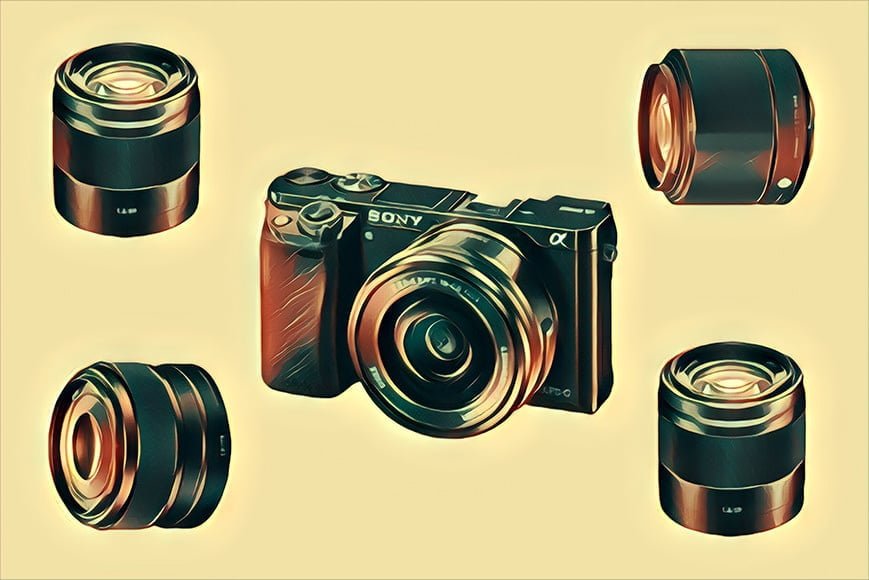
The Sony a6000 lens mount uses standard E-mount lenses (as opposed to full-frame FE lenses), originally designed for the Sony NEX (‘New E-mount eXperience’) series of mirrorless cameras.
The Sony a6000 was actually the first of the new breed of E-mount cameras to lose the NEX branding, even though it still looks much like its NEX predecessors.
There are more than 40 Sony E-mount lenses in production (far more than the number of Fujifilm lenses), giving Sony a6000 owners a great selection to choose from, with more being added each year.
Sony produces ‘FE’ and ‘E’ lenses for its ‘E-mount’ mirrorless camera bodies. (There’s also the A-mount, which is for Sony Translucent Mirror-type camera bodies.)
If you see a Sony lens that contains an ‘E” (as opposed to an ‘FE’), this means that it’s been designed for their APS-C sensor range of mirrorless bodies – i.e. the Sony Alpha a6000, and all the other a6xxx series cameras.
Sony ‘FE’ lenses on the other hand cover the entire 35mm frame of a full frame camera, and as such, can be used on the entire range of Sony mirrorless cameras, even the Sony a6000 (at a 1.5* focal length multiplication).
It’s generally advisable to take advantage of lenses made specifically for the APS-C sensor (i.e. Sony ‘E’ lenses). However, occasionally it does make sense to invest in an FE lens, even if you own the Sony a6000… as you’ll have seen in my lens recommendations above.
Sony Lenses for a6000: FAQs
What lenses work with a6000?
The Sony a6000 uses standard E-mount lenses, designed for its APS-C sensor. It can also use FE-mount lenses, designed for full frame Sony mirrorless cameras.
What’s the best lens for Sony a6000?
The best lens for the Sony a6000 will depend on your requirements. Our top pick is the Sony E 35mm f/1.8 OSS, an affordable, lightweight, compact and fun e-mount lens that allows you to blur the background ‘on the cheap’.
Can I use FE lenses on a6000?
Yes, you can. All Sony FE-mount lenses are compatible with the Sony a6000, and often provide much better image quality than standard e-mount lenses, albeit at a much higher cost.
Can Sony a6000 use A-mount lenses?
No, it cannot, unless you use an adapter, although this isn’t recommended. There are so many good lenses designed for the Sony e-mount, that it’s not necessary to try and use a-mount lenses on a Sony a6000.
Can I use a full-frame lens on APS-C?
Yes, using full-frame lenses on cameras with APS-C sensors is OK. However, the photo frame will be cropped.
How many megapixels is the Sony a6000?
The Sony Alpha a6000 Mirrorless Digital Camera has an actual sensor resolution of 24.7 Megapixels. Yet, the effective resolution value is 24.3 Megapixels.
How to record video on a Sony a6000?
To record a video using the Sony a6000 camera, follow these steps:
- Power the camera on
- Press the small red button on the upper right corner of the camera
- Note the time running, meaning that the video is recording
- Use the same button to stop recording
- To retrieve the recorded video, press the button with the play icon to enter the preview mode
Is Sony a6000 full frame?
No, the Sony a6000 is not a full-frame camera. It has an APS-C size sensor, which is smaller than a full-frame sensor. Full-frame cameras from Sony are generally found in their A7 and A9 series, such as the A7 III or A9 II.
These full-frame cameras offer a larger sensor size and can deliver higher image quality, especially in low light conditions, but they also tend to be more expensive than the cameras with APS-C sensors like the a6000.
Final Words

The Sony a6000 is widely regarded as the most popular mirrorless camera of all time.
In this roundup of what I consider to be the best Sony a6000 lenses, I’ve concentrated on those that I feel reflect the price of the a6000 itself.
It seems counter-intuitive to me to buy a camera that’s around $500, then spend 2 or 3 times the amount on a lens.
I also tried to stick to lenses that won’t look and feel ridiculous on the small-bodied Sony a6000… although at times (with zoom lenses), this was difficult to achieve.
Sony created the E-mount lens line-up specifically for its mirrorless cameras, and in doing so, created lenses that all function very well on cameras like the Sony a6000. If you look at the reviews of any of the Sony E-mount lenses, you’ll see mostly 4 or 5 stars, from thousands of happy users.
It was tough to choose just 5 lenses from such an impressive selection, but I believe that the ones reviewed in this lineup will stand you in the best stead with your beloved little camera :-)
Let me know your thoughts in the comments below – do you agree with my selection?
Affordable, lightweight, compact and fun. Blur the background of your photos to make your subject *pop*. This lens is the best bang for your buck.
![]()





